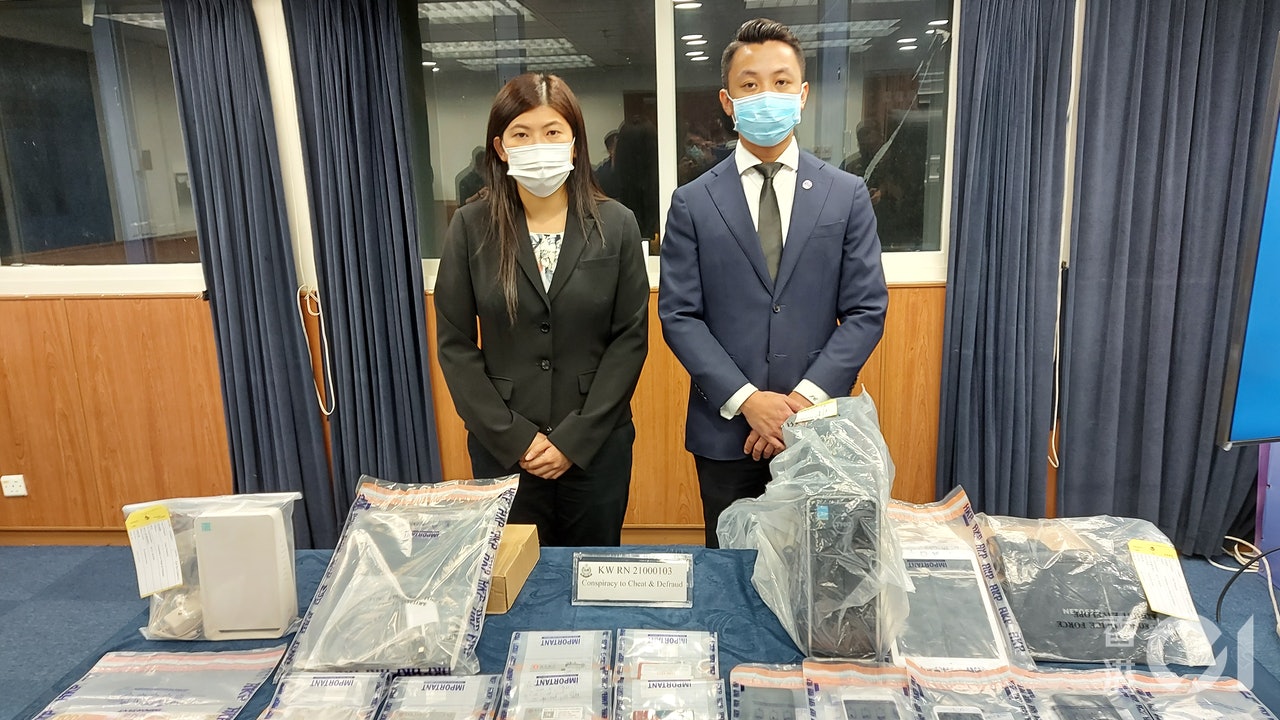Burst
Written by: Yang Wanting and Wang Yiyang
2021-03-08 19:10
The last update date: 2021-03-08 22:55
Recently, some citizens received a fake bank mobile phone SMS, asking users to enter the website link provided by the SMS and apply for triple authentication.
Some victims believed it was true. After logging in to the website and entering their password, they found that their accounts had been transferred many times and suffered losses.
The Regional Crime Squad of West Kowloon Region took over the investigation. Yesterday (7th), in conjunction with the Cyber Crime Bureau, 6 men and 3 women were arrested for conspiracy to defraud. The case initially involved 15 victims and involved an amount of 880,000 yuan.
It is understood that the counterfeit bank is the Bank of China (Hong Kong), which has also issued a notice earlier to remind the public to be careful of being deceived.
Chief Inspector Chen Yumin of the First Team of the Regional Crime Squad of West Kowloon said that between February 27 and March 3 this year, the police received 15 reports from citizens, alleging that they received fake bank SMS, falsely claiming that the victim's account was abnormal, etc. , Asking him to reset his online bank account.
The SMS contains a link to a phishing website that is a fake bank. The victim enters the login name and password after accessing the website. On the other hand, the scammer has used the victim's information to log in to the real bank website to transfer the deposit.
15 cases involved a total amount of 880,000 yuan.
Chen continued that the backbone of the fraud group solicited financial difficulties or "quick money" people who used their bank accounts to claim investment purposes, which was actually used as "puppet accounts" to launder money.
Fraudsters will rent different hotel rooms as mobile operation centers and operate puppet accounts in the rooms to receive and process criminal proceeds received by fake bank fraud websites.
The Regional Crime Squad of West Kowloon and the Cyber Crime Bureau launched an investigation to identify the scammers. On March 7, 6 men and 3 women, aged between 17 and 49, were arrested in multiple locations across Hong Kong, including two mobile operation centers. Among the six arrested persons were those who provided puppet accounts; the other three were key members of the group, responsible for controlling the flow of fraudulent funds and managing the puppet accounts.
The police seized evidence such as bank cards, bank receipts and mobile phones.
Nine people arrested are being detained for investigation, and the police do not rule out more arrests.
Technology crimes increase by 55% in 2020, phishing attacks increase by 35%
Senior Inspector Zhou Zijian of Team 3a of the Cyber Intelligence Section of the Cyber Security and Technology Crime Investigation Bureau said that in recent years, citizens' lifestyles have become more electronic. Coupled with the epidemic, many fraudsters have transferred their fraud platforms from the physical world to the online world.
In 2020, the police recorded more than 12,900 technology crimes, an increase of 55 percent from 2019.
Among them, online scams have more than doubled, and phishing attacks are the most common technology crime method. In 2020, there were more than 3,400 phishing attacks in Hong Kong, accounting for half of the overall security incidents and an increase of 35% from 2019. .
In phishing attacks, scammers generally use emails or short messages to pretend to be online shopping platforms, entertainment platforms or financial institutions, and use links to lure victims into phishing websites and request victims to enter information; take this scam as an example. The fraudster requires the victim to provide a one-time password. After obtaining the relevant information, the fraudster will conduct transactions or transfers online, causing the victim to suffer losses.
The police remind members of the public to be vigilant when receiving an email or SMS request to enter information; make sure that the email or SMS is sent by the relevant agency. When in doubt, take the initiative to clarify to the relevant agency and do not provide any information before the authenticity is confirmed.
The police also urge members of the public not to open hyperlinks in emails or short messages from unknown sources; do not provide anyone with account login passwords or one-time passwords through emails or phone calls; members of the public should also check their account transaction records regularly. Banks should be notified in case of suspicious transactions.
The scam group pretends to be a bank to send text messages to the victims, asking them to enter the phishing website.
Bank of China (Hong Kong) issued a notice last Friday (5th) stating that scammers have sent out fake SMS messages that pretend to be BOCHK, falsely claiming that the customer account settings are abnormal or the verification is unsuccessful. Hyperlinks are used for verification to trick customers into entering personal information on the fake BOCHK website, such as online banking numbers or user names, online banking passwords, and SMS one-time passwords for verification or to apply for triple verification.
The hyperlinks of these fake websites may appear under different domain names or may be slightly modified on the official website of Bank of China Hong Kong www.bochk.com in an attempt to mislead customers.
The bank urges customers to be vigilant and guard against being deceived.
The HKMA calls on: Beware of fraudsters using SMS or email hyperlinks to defraud Internet banking login information
Middle-aged woman in Tai Kok Tsui misbelieves fake bank website and loses 150,000 yuan
Sham Shui Po man who received "bank" phone SMS clicked on the link and his account was transferred 130,000
01News
Fraud







